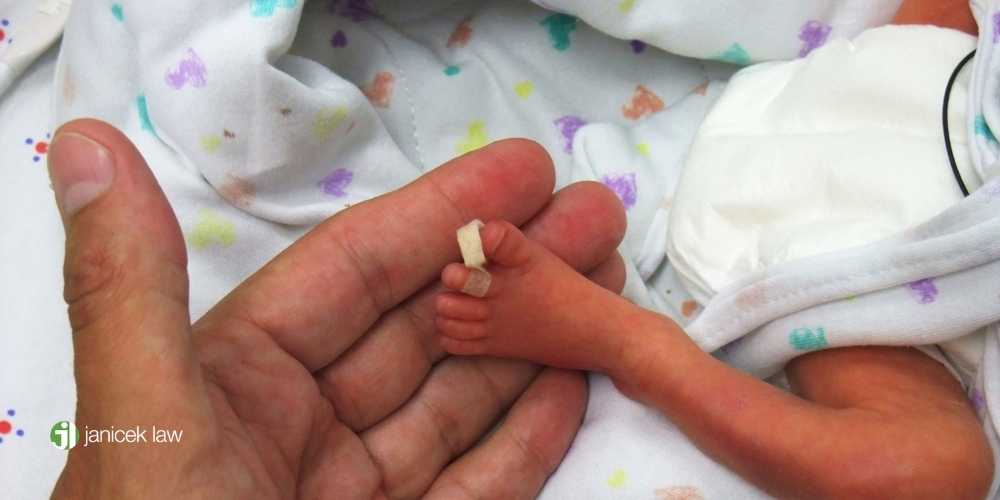San Antonio Lawyers for Infant Chorioamnionitis and Maternal Chorioamnionitis
Chorioamnionitis can result in severe harm to both mother and baby when not properly diagnosed and managed during pregnancy or delivery. For over 30 years, Janicek Law has helped families pursue justice in complex birth injury cases in San Antonio. Our board-certified medical malpractice lawyers are prepared to review your medical records, consult with medical experts, and file a strong case to secure financial compensation if negligence contributed to the mother’s or the child’s injuries.
Call 210-366-4949 or contact us online to schedule a free consultation. We work on a contingency fee basis, so you pay nothing unless we win.
What is Chorioamnionitis, and How is Chorioamnionitis Diagnosed?
Chorioamnionitis Symptoms
Signs and symptoms of chorioamnionitis often appear during labor and delivery, but begin earlier in some cases. Common clinical signs include a maternal fever, a painful uterus, and amniotic fluid that has a bad smell. Fetal tachycardia, or a high baby’s heart rate, may indicate inflammation caused by the infection of the amniotic fluid. Other symptoms of chorioamnionitis may include pelvic pain, excessive sweating, vomiting, and vaginal discharge. When the symptoms of chorioamnionitis go unrecognized, this leads to serious complications for the mother and the baby’s health.
In short, medical providers should never ignore:
Maternal Chorioamnionitis Risk Factors and Signs:
- The patient’s fever during labor and delivery
- Uterine tenderness
- Foul-smelling amniotic fluid
- Maternal tachycardia
- Prolonged rupture of membranes
- Extended labor duration
Laboratory and Diagnostic Red Flags:
- Elevated white blood cell count
- Increased C-reactive protein
- Positive amniotic fluid cultures
- Abnormal fetal blood sampling
When health care providers don’t diagnose chorioamnionitis and provide proper treatment quickly, our San Antonio chorioamnionitis attorneys can help file a medical malpractice lawsuit for clients affected.

Asymptomatic vs Clinical Chorioamnionitis
Clinical chorioamnionitis is diagnosed based on clinical symptoms like maternal fever, uterine tenderness, foul-smelling amniotic fluid, and sometimes, abnormal vaginal discharge. Early diagnosis is often confirmed during labor and delivery through physical exam, lab tests, and amniotic fluid culture when the pregnant woman shows obvious clinical signs of infection.
Asymptomatic chorioamnionitis is a bacterial infection of the amniotic fluid, amniotic sac, or fetal membranes where the mother doesn’t present obvious signs and symptoms during pregnancy. However, this can still harm the mother and the baby. Because symptoms of chorioamnionitis aren’t present, like maternal fever, a painful uterus, or amniotic fluid with a bad smell, this serious infection is often only found after delivery. Doctors diagnose chorioamnionitis by placental pathology, where tissue samples from the placenta or amniotic sac are examined under a microscope for signs of inflammation or infection. In most cases, this infection is caused by group B streptococcus (group B strep) and is strongly linked to premature birth, sepsis, respiratory issues, and other birth injuries.
If medical providers fail to recognize signs, especially in high-risk pregnancies or cases with prolonged labor and frequent vaginal exams, the infection can severely harm both the mother and newborn baby. Failure to diagnose or treat chorioamnionitis may be grounds for a medical malpractice claim, and our San Antonio chorioamnionitis lawyers can help pursue birth injury lawsuits when medical negligence results in preventable harm.
Can Maternal Chorioamnionitis Affect The Baby? Amniotic Fluid Bacterial Infection and Fetal Tachycardia Interventions
Chorioamnionitis can cause an infection that spreads from the amniotic fluid to the umbilical cord. It shows the baby’s immune system is actively fighting a bacterial infection and often signals a more advanced, serious case of chorioamnionitis. One key clinical chorioamnionitis sign is fetal tachycardia, an abnormally fast heart rate that can indicate fetal distress. If health care providers fail to act, the baby faces an increased risk of brain damage, cerebral palsy, sepsis, and other long-term birth injuries.
When pregnant mothers aren’t provided adequate fetal or uterine monitoring, or when they don’t receive timely medical intervention, the family may be entitled to compensation. Our San Antonio chorioamnionitis lawyers can file a medical malpractice claim to secure fair settlements when medical negligence leads to harm.

What Causes Chorioamnionitis and How is Chorioamnionitis Treated?
Bacteria commonly cause chorioamnionitis. Chorioamnionitis occurs when a bacterial infection enters the uterus during pregnancy. The infection occurs in the genital tract and travels to the amniotic fluid, fetal membranes, and placenta. Common bacteria include group B streptococcus (group B strep), E. coli, and other vaginal infections. Risk factors for chorioamnionitis arise from prolonged labor, frequent vaginal examinations, internal fetal monitoring, prolonged rupture of membranes, and epidural anesthesia. Expectant mothers with a short cervix, vaginal infection, or gestational age near term are at increased risk.
To treat chorioamnionitis, doctors often begin with antibiotics to fight the serious infection and prevent complications for the mother and baby. Once physicians diagnose chorioamnionitis, delivery is recommended to prevent possible complications. To avoid preterm labor, doctors may attempt to balance blood infection control with fetal development, but early delivery is often necessary. In some cases, a C-section may be required. Proper treatment reduces the risk of birth injuries, maternal complications, and permanent injuries to the newborn baby, even if delivered prematurely.
When expectant mothers or premature babies suffer because a doctor didn’t recognize signs of infection, didn’t treat chorioamnionitis quickly, or left the infection untreated, this justifies a birth injury lawsuit. Our San Antonio chorioamnionitis attorneys can help recover damages for the mother’s serious condition and the child’s injuries that may follow.
When are Texas Healthcare Providers Responsible for Maternal Chorioamnionitis or Infant Chorioamnionitis
Texas doctors may be legally responsible for injuries when they don’t provide an early diagnosis, delay treatment, or use inadequate uterine monitoring or internal fetal monitoring during prolonged or premature labor. Liability often arises if the physician ignores risk factors, like offputting smells when membranes rupture, frequent vaginal exams, or other forms of negligence when infection is present. Liability can also apply when a failure to order timely lab tests, negligence in preventing infections during pregnancy, mismanagement of prolonged or premature rupture of membranes (PROM), or lack of appropriate medical intervention contributes to preventable injuries.
Lawsuit for Maternal Chorioamnionitis Injuries
Sepsis and Septic Shock
This serious infection may lead to systemic inflammatory response syndrome (SIRS), multi-organ dysfunction syndrome (MODS), or even cardiovascular collapse if left untreated. In pregnant women and newborns, failure to control infection of the amniotic fluid or surrounding tissues may escalate to neonatal or maternal sepsis. When medical providers delay medication or fail to recognize symptoms, patients face a higher risk of death. Our legal team handles San Antonio sepsis malpractice claims involving medical negligence, complications, and health problems that result in long-term injury or fatalities.
Severe Hemorrhage and Emergency Hysterectomy
Severe hemorrhage during labor and delivery may result from chorioamnionitis, long labor, or medical negligence. When medical providers don’t control bleeding, the situation can escalate to uterine atony, hypovolemic shock, or disseminated intravascular coagulation (DIC) in Texas. In critical cases, an emergency hysterectomy may be performed to save the expectant mother, leaving her unable to have more children. Families may pursue a medical malpractice lawsuit when medical providers delay interventions that lead to life-threatening complications.
Postpartum and Systemic Infections
Chorioamnionitis can cause postpartum and systemic infections, including endometritis, parametritis, pelvic abscess formation, or wound infections after a cesarean section or vaginal delivery. These severe infections can spread through the bloodstream, leading to bacteremia, urinary tract infections, pneumonia, or even meningitis. When doctors fail to diagnose or treat a blood infection in a timely manner, the risk of complications for both the mother and newborn baby increases. A delayed response may justify filing a malpractice lawsuit for serious conditions.
Reproductive and Gynecologic Injuries
Reproductive and gynecologic injuries from chorioamnionitis may include uterine rupture, uterine scarring and adhesions, or Asherman’s syndrome, all of which can affect future fertility. Chronic endometritis, secondary infertility, and a higher risk of ectopic pregnancy or recurrent pregnancy loss are also possible. When medical providers don’t diagnose or treat the infection properly, affected mothers may have grounds to file a malpractice lawsuit.
Surgical Complications From Emergency Interventions
Surgical complications from emergency interventions may occur when doctors perform an unplanned cesarean section or emergency hysterectomy due to untreated chorioamnionitis. These procedures can lead to surgical site infections or bladder and bowel injuries in San Antonio. If a medical team doesn’t take timely action or makes critical errors during surgery, families may file a malpractice claim to recover damages.

Claims for Child’s Injuries Caused By Chorioamnionitis in Texas
Brain Damage
Brain damage linked to chorioamnionitis includes hypoxic-ischemic encephalopathy (HIE), periventricular leukomalacia (PVL), intraventricular hemorrhage (IVH), cerebral edema, and brain abscesses. These injuries result from oxygen deprivation, infection, or inflammation in the womb. HIE claims in San Antonio often involve not monitoring fetal distress or emergency delivery delays.
Cerebral Palsy and Movement Disorders
Cerebral palsy and other movement disorders can result from oxygen deprivation or infection caused by chorioamnionitis. If medical providers fail to respond to signs of fetal distress or delay necessary intervention, families may be eligible to file cerebral palsy claims in San Antonio.
Seizure Disorders
When chorioamnionitis occurs, inflammation caused by severe infections in the amniotic fluid can quickly spread to the fetus, causing brain damage or seizure disorders, especially after preterm births. If chorioamnionitis symptoms are ignored by the medical team, the risk of serious complications rises, especially for premature babies or those delivered after long labors without adequate treatment.
Cognitive, Vision, and Hearing Problems
When chorioamnionitis affects the fetus during labor and delivery, the newborn baby is more susceptible to cognitive issues such as poor memory, reduced attention span, and difficulty with language. Vision issues may include partial blindness, impaired visual tracking, or cortical visual impairment. Hearing problems can involve partial or complete hearing loss, auditory processing issues, or deafness. Our attorneys can help file hearing or vision loss claims in San Antonio on behalf of victims of medical negligence.
Neonatal Sepsis
Neonatal sepsis can happen when bacteria from the amniotic fluid or an infection enter the baby’s bloodstream. This often results in brain injuries and other potential complications. We use medical records and reviews to help clients understand their legal rights and secure fair recoveries for preventable birth injuries.
Heart and Respiratory Problems
Chorioamnionitis treated too late can affect the baby’s lungs and heart function. Breathing difficulties, tachycardia, and respiratory problems are common signs that a baby was exposed to infected fluid.
Gastrointestinal Problems
Gastrointestinal problems caused by chorioamnionitis can include feeding difficulties, poor digestion, swollen abdomen, and a higher risk of necrotizing enterocolitis (NEC). When these complications develop from medical negligence, our attorneys can help victims pursue NEC malpractice claims in San Antonio.
Physical Disabilities
Chorioamnionitis can potentially cause lasting physical disabilities when inflammation occurs in the womb, disrupting fetal development over an extended period. Joint contractures, hip dislocation, and scoliosis may result from restricted movement or neurological damage. Growth restrictions are also common, especially in cases of preterm birth, and can contribute to low bone density issues like osteopenia or osteoporosis later in life.

Texas Statute of Limitations for Birth Injury Lawsuits
In Texas, the statute of limitations for filing a birth injury lawsuit is typically two years from the date of the injury. For the mother’s injuries, this deadline starts on the date of labor and delivery. For a baby’s injuries, Texas law allows additional time under the tolling provision. Parents usually have until the child’s 14th birthday to file a claim related to birth injuries. However, deadlines can vary based on specific facts, so early legal review is critical.
Contact our San Antonio Maternal and Infant Chorioamnionitis Lawyer Team For a Free Consultation
If you suspect chorioamnionitis caused harm to you or your baby, contact Janicek Law for a free case evaluation. We understand the complexities of these cases and can determine if a malpractice claim is appropriate under Texas law. Call 210-366-4949 to speak with our legal team.
